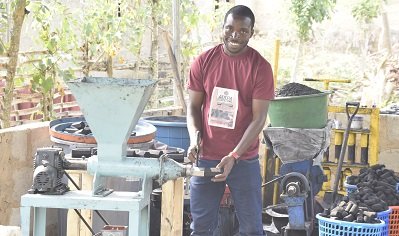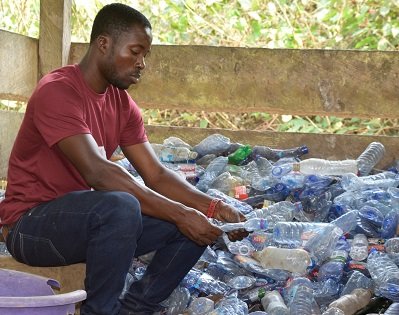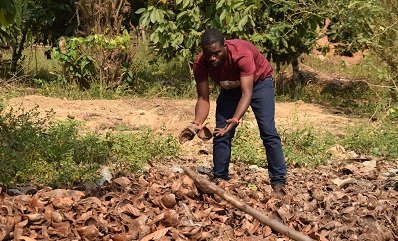Hot!
Ernest Twum Barima makes coconut husk, plastic waste valuable

Realising the extent of waste pollution in his vicinity and the country at large, he thought of alternative ways to make good use the situation. He ended up creating a job for himself and a few others.
Here is Mr Ernest Twum Barima, the young university graduate, whose company produces smokeless and long-lasting charcoal briquettes from coconut husk.

The product, targeted at households and institutions, continues to earn positive review and commendation as the manufacturer intends to scale up production to meet local and international demand.
Business
Ernest is a graduate of Koforidua Technical University (KTU) and Valley View University. He studied Purchasing and Supply at KTU before proceeding to Valley View where he obtained Bachelor of Education (B.Ed.) and Information Technology in Education Management.
He conceived the business idea while studying at Valley View University and decided to roll it out after many attempts to secure a job.
Throughout his educational journey, he had dreamt of establishing his own company and it is, therefore, not surprising that he has surmounted the hurdle.
Currently based at Kyebi-Afiesa in the Eastern Region, the venture known as Adepafie Market Company Limited, began when he procured and distributed 100 pieces of waste bins to encourage responsible waste disposal.
As time went by, he noticed the volume of waste generated daily by coconut vendors in his area and decided to conduct studies into unconventional uses of the discarded coconut husk.
“After I discovered other uses of the coconut husk, I gave empty sacks to the coconut sellers and asked them to offload the husks at my house at the end of every business day.
“My family initially could not come to terms with why I was turning our house into a dumpsite for coconut husk and even thought I had lost my mind,” he told The Spectator.
Unperturbed by these unsavoury comments, however, Ernest kept fine-tuning his idea until 2019, when he produced the first batch of charcoal briquettes to be used at home.
Community members, impressed with the outcome, subsequently encouraged him to start producing for commercial use.
Challenges
According to the initiator, steps towards commercialisation was challenging as he sought financial and technical assistance from some private entities but they failed to deliver on their promise after series of engagement with them.
Undauntedly, he relied on personal savings and the support of family and friends to get his idea off the ground. And with barely a year into his business, he has employed six people who are supporting him presently.
Apart from making charcoal briquettes, Ernest again recycles plastic waste into pavement bricks which, he said, could be a substitute for concrete blocks used in road construction.
Production process
Explaining the making of the charcoal briquettes, he said “the coconut husk is allowed to dry and later burnt and crushed into powder. The powder is then compacted with an organic binder, extruded and moulded into desired shapes and finally left to harden.”
He said he used to go through these processes manually but had now been able to build a makeshift machine which enables him to produce faster.
“I could produce only two bags of charcoal briquette in three days when there was no machine, but I am now able to produce about 10 bags in a day. The quality has improved and it is currently in high demand,” he said.
The charcoal briquette is packed in paper bags, made from plantain stem, and sold at GH 3.00 per Kilo.
The Chief Executive Officer says he has intended to reduce the price in future and has encouraged traditional charcoal producers to adopt his approach and stop cutting trees for charcoal production.
Future
In spite of the progress made, Ernest continues to fall on the support of family and friends to fund his operations.
“I could not meet the requests of my clients previously but I can now meet their need within a month with the little machine I use at the moment.
“I receive a lot of orders from across the country and if I get the needed support to expand production I know things would get better,” he noted.
The mini factory for the charcoal briquette, he said, was situated on a piece of family land, and he would require modern machines and vehicles to convey raw materials to help speed up production.
Although the company makes some profit, Ernest says the income generated goes into repayment of loans he has secured from family and friends.
With the required support, he intends to set up a bigger factory in Accra and Kumasi and employ more youth, should he get the needed support.
By Ernest Nutsugah
Hot!
Four ‘Pragya’ Operators fined GH¢ 2,400 for obstructing public road at Agbogbloshie

Four tricycle operators, popularly known as ‘Pragya’, have been prosecuted and fined GH¢600 each equivalent to 50 penalty units by the Accra Metropolitan Assembly (AMA) Sanitation Court for obstructing public roads at the Agbogbloshie Market.
The offenders, who were arrested by Public Health Officers of the AMA during a routine enforcement exercise, pleaded guilty to the offence and were subsequently convicted by the court.
The four operators were among the 21 offenders recently arrested at the Agbogbloshie Market for various sanitation and public order violations, including selling on open drains, obstructing walkways, and trading at unauthorised locations.
Speaking after the court proceedings, the Head of Public Health at the AMA, Madam Florence Kuukyi, said the court was lenient with the offenders since it was their first appearance, hence the fine, and warned that subsequent offenders would face stiffer penalties, including imprisonment.
Hot!
Police arrest suspect in Taxi driver murders in Accra

The Ghana Police Service has arrested a man believed to be behind a series of robberies and killings of taxi drivers in the Greater Accra Region.
According to a statement from the Criminal Investigation Department (CID), the suspect, Peter Akakpo, also known as “Dompe,” was arrested on October 13, 2025, at Kasoa-Domeabra.
Police say he is an ex-convict and is believed to have worked with another suspect, Vincent Gbetorglo, who was arrested earlier on June 30, 2025.
The arrests follow investigations into the deaths of two taxi drivers at Sakaman Blue Lagoon on May 9 and June 15, 2025. Police say the suspects contacted the victims before the attacks.
The Anti-Armed Robbery Unit of the CID led the investigation, using intelligence and surveillance to track down the suspects.
Police say efforts are being made to recover the vehicles of the murdered drivers.
The CID assured the public that investigations are still ongoing and promised to provide updates as new information emerges.
By: Jacob Aggrey






